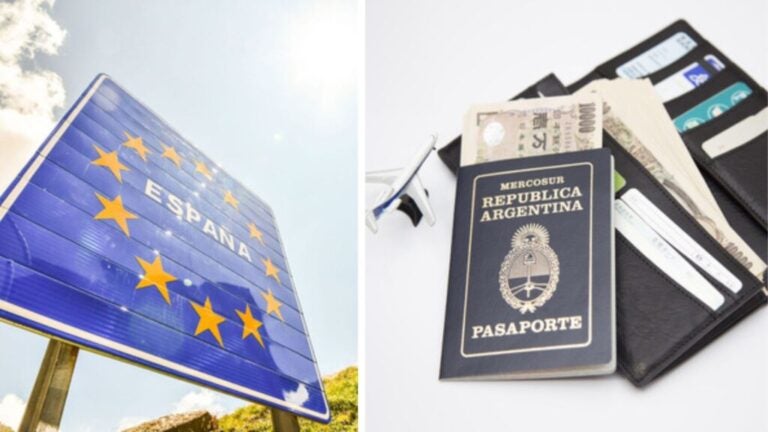Spanish work and holiday visa for Argentinians: Complete guide
The Spanish work and holiday visa for Argentinians offers a unique opportunity to work, study, and explore Spain.
If you’ve ever dreamed of living in Spain, exploring its historic cities, working abroad, or simply changing scenery for a while, a Spanish work and holiday visa for Argentinians could be your gateway.
This programme, designed exclusively for young people aged between 18 and 35, allows you to live, work, and study in Spain for up to 12 months. It’s a unique chance to dive into Spanish culture and gain international work experience.
Throughout this guide, we’ll explain what this visa actually is, its benefits, who can apply, the requirements and documents you’ll need, how to apply step by step, how much it costs, and of course, some key tips so you won’t get lost in the process.
Did you know this option existed? If you didn’t, sit back and keep reading – this information will be spot on for you.
What Working Holiday visas does Spain offer for Argentinians?
Unlike other countries such as Australia or New Zealand, where several Working Holiday visa types exist, Spain offers only one specific option for Argentinians: The Working Holiday visa, part of the Youth Mobility Agreement signed between both countries.
This visa, officially known as the “Visa for the Youth Mobility Programme between Spain and Argentina”, allows Argentinian citizens to live, work, and study in Spain for up to 12 months. It’s worth noting that this youth mobility agreement, subject to limited yearly quotas, is the only route for Argentinians to experience a Working Holiday stay in Spain.
Therefore, throughout this article, we’ll focus exclusively on this visa, which is currently available for Argentinian citizens eager to live a cultural and professional season in Spain.
What are the benefits and features of the Working Holiday Spain visa for Argentinians?
The Working Holiday Spain Visa is your key to an unforgettable life experience. Thanks to the Youth Mobility Agreement between both countries, this visa lets you live legally in Spain for up to 12 months, with the big advantage of being able to work and study simultaneously.
One of its main benefits is job flexibility. Although the programme’s main goal is to promote cultural exchange, you can work legally for up to six months during your stay. That’ll help you fund your trip, cover accommodation, food, and leisure expenses, or even save money to continue travelling across Europe.
Also, unlike other types of visas, you don’t need a prior job offer to apply. That gives you the freedom to look for a job once you arrive in Spain, adapt to the local job market, and choose the kind of work that best matches your profile and goals.
Another great advantage is that it allows you to study for up to six months. So you can take advantage of your time in Spain to attend a language course, a short training programme, or join a specialised workshop.
Of course, one of the most exciting aspects is that you can travel freely throughout Spain. And if your budget allows, you can also explore other countries in the Schengen Area during your free time. Imagine visiting the charming towns of Costa Brava, hiking the Picos de Europa, strolling through vibrant cities like Madrid, Barcelona, Seville, or Santiago de Compostela, and tasting the delicious Basque cuisine. All that and more is possible with this visa.
In short, the Working Holiday Spain Visa combines freedom, educational and work opportunities, and the chance to live immersed in one of Europe’s most vibrant cultures. It’s truly a gateway to new experiences, friends, and lifelong learning.

Who is this visa for?
Although spending 12 months living and working in Spain sounds tempting, this type of experience isn’t for everyone. The Working Holiday Spain Visa targets young Argentinians seeking more than traditional tourism. For instance, if you want to dive into Spanish daily life, learn its traditions, improve your language skills, and become part of society for a year, you should definitely apply.
It’s also a great opportunity for those without enough savings to spend a full year in Europe. As an Argentinian, you know travelling abroad often demands effort and months of saving. If you’re ready to go but can’t afford all expenses, this visa lets you work legally for up to six months, helping you fund your stay.
The visa allows you to stay in Spain for up to one year. That means you’ll have enough time to explore the country calmly, enjoy every city and village, and even visit other European destinations within the Schengen Area. You could work during the first six months, enjoy local tourism on weekends, and use the rest of the year to travel across Spain or Europe.
You might also want to gain international experience for your CV. After all, it can make a big difference when applying for jobs abroad or with multinational companies. If your goal is to experience the European job market or strengthen your professional background, this visa makes it possible.
Lastly, this visa appeals to those who wish to take short courses — like cooking, photography, or languages — lasting up to six months. That way, you’ll combine work, education, and travel in one of the world’s most exciting countries.
What’s the best part? You don’t need a fixed plan before travelling. If you prefer deciding on the go, finding a job once you arrive, or seeing where the experience takes you, this is the perfect option. In short, it suits independent and flexible travellers.
What are the requirements to apply?
If you identify with the type of traveller we’ve described and feel this experience suits you, don’t rush. Don’t let anxiety take over — prepare a solid application. As you can imagine, to apply for a Working Holiday Spain visa, you must meet certain requirements and submit several documents.
Below, we detail the conditions you’ll need to meet and the documents required. Take note, start gathering them early, and apply once you’ve got everything ready.
General requirements:
- Nationality and residence: Must be an Argentinian citizen and normally reside in Argentina. Present a valid Argentinian DNI showing your address within the jurisdiction of the relevant Spanish Consulate (Buenos Aires, Córdoba, Rosario, Bahía Blanca, or Mendoza).
- Age: Be between 18 and 35 years old at the time of application.
- Passport: Hold a valid ordinary passport with at least one year of validity remaining at the time of application.
- Financial means: Prove sufficient funds to cover your stay. You must show evidence of €1,134.00 ($1,230.00) for each month of your planned stay in Spain (around ARS 1,600,000 (€1,600.00 ($1,740.00))). That totals €13,608.00 ($14,780.00) for the full 12-month visa (about ARS 19,000,000 (€19,000.00 ($20,700.00))). For Córdoba’s Consulate, proof of €15,120.00 ($16,430.00) is required (around ARS 21,000,000 (€21,000.00 ($22,900.00))).
- Health insurance: You must have full medical and accident insurance covering hospitalisation and repatriation in case of illness or death during your entire stay. Check out the best options for medical insurance for foreigners in Spain!
- Criminal record: Have no criminal record. You must present a legalised and apostilled criminal record certificate issued within the last three or six months, depending on the Consulate.
- Education: Hold a university degree, have completed at least two years of university studies, or possess an equivalent higher education qualification.
- Return ticket: Possess a return ticket or show proof of funds sufficient to purchase one.
- Photographs: Provide photographs according to the Consulate’s required size and format.
- NIE application: Apply for the Foreigner Identification Number (NIE) at the same Consulate.
- No dependants: Applicants with dependants are not eligible.
Documentation to be submitted

- Application form: Complete and sign the official visa application form.
- Passport: Original and coloured copy of your Argentinian passport valid for more than one year.
- DNI: Original and copy of your Argentinian ID (front and back) showing an address within the Consulate’s jurisdiction.
- Photograph: One recent passport-sized photo according to Consulate specifications.
- Criminal record certificate: Issued by the National Registry of Recidivism, apostilled, and no older than three or six months, depending on the Consulate.
- Degree or proof of study: University diploma, certificate proving at least two years of university studies, or equivalent higher education qualification.
- Proof of financial means: Bank statements, notarised letters, or third-party guarantees, properly legalised and accompanied by documents proving family ties if applicable.
- Health insurance: A policy covering hospitalisation and repatriation with a minimum coverage of €30,000.00 ($32,600.00).
- Return ticket or funds: Proof of a return flight or evidence of sufficient funds to purchase one.
- Payment receipts: Proof of payment for the visa fee (€84.00 ($91.00), around ARS 96,000 (€96.00 ($104.00))) and the NIE application (€10.00 ($10.90), about ARS 11,000 (€11.00 ($12.00))).
Each Consulate may have additional or specific requirements. Always check the updated information on the official Consulate website before starting your application.
What are the steps to obtain the Working Holiday Spain visa for Argentinians?
Now that you know the requirements and necessary documents, it’s time to send your application. The process to obtain the Working Holiday Spain Visa requires organisation and attention to detail to avoid delays. To make it easier, here’s a step-by-step guide — from preparing your documents to getting the visa in hand and planning your trip to Spain.
1. Gather all required documents
It may sound obvious, but it’s worth repeating. The first thing you must do is collect and prepare all documents requested by the Spanish Consulate where you’ll apply. This includes your valid passport, DNI, apostilled criminal record, proof of funds, academic certificates, health insurance, and passport photos according to the Consulate’s format.
You’ll also need to complete the official visa application form and the NIE (Foreigner Identification Number) form.
2. Apostille the necessary documents
Documents issued by Argentinian authorities (like your criminal record or university degree) must be legalised with The Hague Apostille. You can do this at the Ministry of Foreign Affairs in Argentina or through authorised offices across the country. Double-check that all required documents are apostilled before moving forward.
3. Book an appointment at the corresponding Spanish Consulate
Once your documents are ready, the next step is to book an appointment to submit your visa application. Each Spanish Consulate in Argentina (Buenos Aires, Córdoba, Rosario, Mendoza, or Bahía Blanca) has its own online booking system. Visit the website of your corresponding Consulate and choose the option “Youth Mobility Programme” or “Working Holiday”, depending on how it appears in their system.
4. Submit your visa application
Attend your appointment in person on the date and time assigned by the Consulate to submit all documents. Remember to bring both originals and copies. In addition, at that time you’ll need to pay the corresponding fees: ARS 96,000 (€100 ($108)) for the visa and ARS 11,000 (€11,50 ($12,50)) for the NIE process, according to the rates valid as of June 2025.
5. Track your application
You’re all set! You’ve submitted everything and paid the consular fees — now you only need to wait while your application is processed. Processing time varies by Consulate but generally takes between two and eight weeks.
Check your email regularly, since the Consulate will contact you if they need extra documents or have questions about your application.
6. Collect your visa and NIE
Once you receive the long-awaited email confirming your approval, you can collect your passport with the visa stamp and your NIE. This document will be essential during your stay in Spain, as you’ll need it for tasks like opening a bank account, finding a job, or signing service contracts.
Once everything is ready, you can start the best part: Organising your trip! Get ready to organize your trip! Spain awaits you with vibrant cities, culture, gastronomy, and endless opportunities for an unforgettable experience.
What’s the best way to have internet in Spain?
It’s not a mandatory requirement for travelling, but knowing how you’ll stay connected in Spain is key to your Working Holiday experience. Whether you’re job hunting, scheduling interviews, finding accommodation, or simply keeping in touch with friends and family, having a fast, stable connection makes everything easier.
If you want to avoid the usual stress of arriving without signal, one of the best solutions is the Holafly eSIM for Spain. With it, you’ll have unlimited data from the moment you land, without searching for a local shop or waiting in line for a physical SIM. However, since you’ll spend several months in the country, the best option might be to choose one of Holafly’s monthly plans. With their unlimited data plan, you can browse freely and enjoy your Working Holiday in Spain without worrying about data limits.
The best part is that you can travel around Europe too, since their eSIM is global (it works in over 170 countries worldwide). You won’t need to change your plan or buy new eSIMs each time you arrive in a new destination.
Both options are easy to activate, compatible with most smartphones, and will keep you connected without worrying about data usage or international roaming.
Important: If you are a frequent traveler and want to stay connected without worrying about expensive roaming or looking for a new SIM at every destination, Holafly’s subscription plans are for you. With a single eSIM, enjoy internet in more than 170 countries for a fixed price and no surprises on your bill. Travel without limits and connect easily and securely! 🚀🌍

What costs should you consider when applying for the Working Holiday Spain visa?
If you’re planning to apply for the Working Holiday Spain Visa, it’s essential to consider the costs involved in the process. We’ve already mentioned some of them, but below you’ll find the main expenses you should plan for, so you can estimate how much money you’ll need in advance.
- Visa fee: ARS 96,000 (€96.00 ($104.00)). This amount must be paid when you submit your application at the Consulate.
- NIE application fee (Foreigner Identification Number): ARS 11,000 (€96.00 ($104.00)). The NIE is essential for procedures in Spain, like opening a bank account or signing a work contract.
- Required financial means: €1,134.00 ($1,230.00) per month — around ARS 1,600,000 (€1,600.00 ($1,740.00)) for each month of stay in Spain.
- International health insurance: €300.00–500.00 ($326.00–543.00) per year (ARS 420,000–560,000 (€420.00–560.00 ($456.00–609.00))). You must have insurance covering hospitalisation and repatriation with a minimum coverage of €30,000.00 ($32,600.00) during your entire stay.
- Round-trip flight or funds to buy one: Between €1,000.00–1,500.00 ($1,086.00–1,630.00), depending on your departure city and travel season. That’s about ARS 1,400,000–2,000,000 (€1,400.00–2,000.00 ($1,520.00–2,170.00)). You must show your return ticket or proof of sufficient funds to purchase it.
- Apostilles and translations: ARS 50,000–100,000 (€50.00–100.00 ($54.00–109.00)). Some documents, like the criminal record certificate, must be apostilled and, in some cases, translated into Spanish.
- Other administrative expenses: approximately ARS 20,000–50,000 (€21–53 ($23–57)). This includes costs such as notarized certifications or additional legalizations that may be required.
As you can see, living this kind of experience isn’t exactly cheap, but with proper planning, it’s doable. Remember that these values are approximate and may vary depending on exchange rates and service providers. We recommend keeping an extra margin for unexpected costs and personal expenses during your first days in Spain.
Frequently asked questions about the Working Holiday Spain visa for Argentinians
No, this youth mobility agreement isn’t a tourist visa. Once the 12 months are over, you must return to Argentina. During the application, you’ll sign a commitment to return, confirming you’ll go back when your visa expires. Also, remember Spanish and Schengen laws don’t allow status changes from within Spain.
Yes. One way to meet the education requirement is by completing at least two full years of university studies, even without a degree. You can also apply with a tertiary or higher non-university qualification. Just make sure your certificates are official and apostilled under The Hague Convention.
The visa lets you work for up to six months within the 12-month validity period. This means you’ll be able to decide how to organize those six months — working continuously or in intermittent periods. What’s not allowed is extending your work period beyond that limit.
At present, the annual quota for Argentinians is 500 visas per year. This number might change if Spain adjusts the bilateral agreement. Since spots are limited and demand is high, we suggest preparing your documents early and watching for appointment openings at your Consulate.





 Language
Language 


















 No results found
No results found






